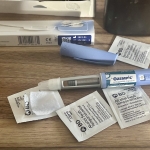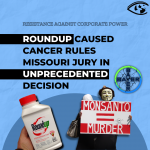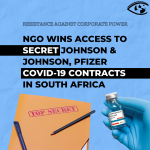USA: Feds Pushing Toxic Anthrax Drug?
Many veterans' advocates believe a certain anthrax vaccine to be a major cause of Gulf War sickness. The company manufacturing it has launched a massive lobbying campaign to persuade the Bush administration to stockpile the controversial drug so it can be administered to civilians.
Armed with a report prepared by a panel of company-paid scientific guns for hire, Lansing, Michigan-based BioPort is urging Congress to create a "civilian equivalent of the U.S. military's Anthrax Vaccine Immunization Program (AVIP)."
BioPort cites anthrax-bearing letters received by Sens. Tom Daschle (D-S.D.) and Patrick Leahy (D-Vt.) as evidence that the United States needs "an articulated preparedness plan for immediate immunizations of at-risk civilians (and) a strategic anthrax vaccination stockpile" of the company's BioThraxin (known as MDPH-PA or AVA before January 2000).
But some experts say the vaccine, which has been repeatedly withdrawn from distribution following FDA and congressional investigations, might not have been effective against the bio-engineered tech strain of anthrax mailed to Daschle and Leahy.
"The technology behind the Daschle letter, later the Leahy letter, was very sophisticated," said Francis Boyle, professor of law at the University of Illinois and a principal author of the Biological Weapons Anti-Terrorism Act of 1989.
"(It contained) a trillion spores per gram," Boyle said. "That is super-weapons grade. Second, tied in there was a special treatment to eliminate electrostatic charges so it would float in the air. You have to have special equipment, special treatment, special everything.
"The only people who would have the capability to do this would be individuals who either are currently employed by the Department of Defense or the CIA doing biowarfare work, or had been employed by the Department of Defense or the CIA doing biowarfare work."
According to BioPort, which counts the Pentagon as its only anthrax-vaccine customer, over 2 million doses of its vaccines "have been given to over 500,000 service men and women."
But some critics contend the company may come to regret even mentioning the AVIP in its bid to add the compound to the nation's civilian preparedness arsenal.
Originally known as the "total-force anthrax vaccination program," AVIP was launched by Defense Secretary William S. Cohen in late 1997. Cohen's original order called for all 2.4 million members of the active and reserve armed forces to receive six shots of the vaccine over an 18-month period, followed by annual booster shots.
Also in 1997, Ret. Admiral William Crowe, Jr., chairman of the Joint Chiefs of Staff under Presidents Reagan and Bush and Bill Clinton's chief defender against charges of draft-dodging during the 1992 campaign, stepped down as President Clinton's ambassador to Britain. After returning to civilian life, Crowe purchased a substantial interest in BioPort, which received a Defense Department contract to supply the vaccine for the AVIP program shortly thereafter.
(Crowe has also been accused by some in the military, including Ret. Air Force Major Glenn MacDonald, editor-in-chief of militarycorruption.com, of being involved in the sale of the anthrax bacillus (Bacillus anthracis) to Saddam Hussein during Iraq's war with Iran.)
Mindful of evidence purportedly linking the anthrax drug to unusually high rates of brain tumors and other cancers, unremitting headaches, chronic insomnia and drug-side-effect-related deaths among Gulf War veterans and other military personnel who had received the vaccine, some Defense Department doctors refused to administer the drug, and numerous service personnel refused to take the shots.
At least 37 dissenters have been court-martialed and many career officers have resigned from the service rather than submit to vaccination.
Despite the Pentagon's favorable response to a BioPort request for indemnification from liability from "the unusually hazardous risks associated with potentially severe adverse reactions ... of the AVA," the FDA halted implementation of the "total-force" program in 1998. Citing quality-control problems at BioPort's manufacturing facility, the FDA ordered the company to cease shipment of the vaccine.
In June 1999, BioPort informed the Defense Department that it would run out of cash Aug. 1 and was unable to borrow enough funds to continue operations. Hoping to get the vaccination program back on track, the Pentagon agreed to raise the per-dose price of MDPH-PA from $4.36 to $10.64. As part of the new deal, the Defense Department also gave BioPort an $18.7 million interest-free advance payment.
Despite contractual conditions restricting the use of the advance payment to vaccine-production-related expenses, a Department of Defense inspector general's audit in 2000 revealed that over $2 million of the money was spent on office furniture for BioPort's CEO, travel and other unrelated expenses.
Like Gen. Douglas MacArthur's old soldier of oratory fame, the "total-force" program finally faded away after a congressional investigation of Gulf War sickness revealed that the Pentagon had lied about the use of squalene, an enzyme thought to improve vaccine effectiveness but not approved by the FDA, in MDPH-PA.
"We have an obligation to pursue the truth, wherever it may lead us," Rep. Jack Metcalf said in announcing the squalene findings and calling for the termination of the AVIP program. "To do less would be to act dishonorably toward the dedicated men and women who stand between us and a still-dangerous world."
In September, the Defense Department announced resumption of a scaled-down AVIP program to be administered "consistent with U.S. Food and Drug Administration-approved labeling and the best practice of medicine."
Three companies -- two of them working under contracts issued earlier this month by the Department of Health and Human Services -- are vying to produce a genetically engineered anthrax vaccine without the risks of BioThraxin, which is manufactured from a non-lethal variant of the anthrax bacteria.
FDA approval of any new anthrax vaccine is expected to take up to seven years.
- 122 Pharmaceuticals
- 124 War & Disaster Profiteering



